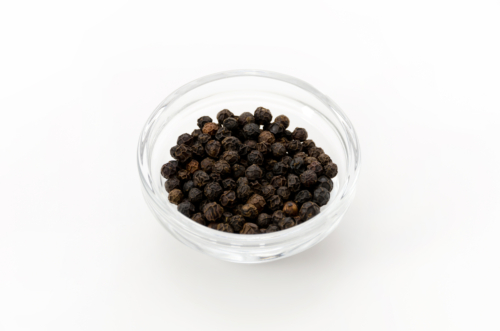
Herbs and spices have long been used to create tasty meals, as well as for their many mild therapeutic effects. They can possess antimicrobial, anti-inflammatory, antirheumatic, lipid-lowering qualities, are protective of the liver, kidney and gut, and have anticancer activities. Plus they’re safe. Black pepper may be an exception. Especially in higher amounts it poses potential problems, which I’ve noted throughout my career and will summarize again here.
Like the green version, black pepper is the cooked and dried unripe fruit from the Piperaceae family. The ripe seed of the fruit is white pepper. Black pepper should not be confused with red pepper, which is from an entirely different plant. While large amounts of red pepper could cause gut irritation in susceptible people, it does not have the potential damaging effect that black pepper has and offers many positive therapeutic properties.
We learned in the 1960s that the phytochemical safrole, found in such spices as sassafras and black pepper was potentially toxic in higher amounts. Subsequently, sassafras was removed from root beer, but people continued using pepper.
While the occasional black pepper sprinkle may not be harmful, higher amounts are typically used in cooking, packaged foods and at the dinner tables of almost everyone having the traditional salt and pepper shaker. Waiters anxiously await your nod for freshly ground pepper from those big grinders. I just say no, but that I’d prefer freshly ground sea salt—which often brings a puzzled look.
Despite the evidence that salt is not harmful (unless you are sodium sensitive), using less or no salt is still the norm, giving people added reasons to use more black pepper. And, with aging, poor health and bad eating habits, taste and smell sensation can wane, increasing further the amount of black pepper used. And, most black pepper is ground, usually long ago, reducing its flavor and contributing to the use of higher quantities.
Sufficient amounts of black pepper can increase free-radical production. It is this oxidative effect that may trigger intestinal irritation. Higher doses of black pepper may be comparable to the harmful gut effects of a single dose of aspirin, which causes mild intestinal bleeding. This micro-bleeding can occur with black pepper, which can also reduce the stomach’s secretion of healthy digestive juices.
Because so much of the immune system is housed in the gut, immunity may be compromised too, along with function of the urinary tract, prostate, and potentially elsewhere.
Many people have heard black pepper can improve absorption of turmeric’s phytonutrients, but this is only because the irritation of the gut by pepper damages the lining of the gut making it easier to absorb compounds into the bloodstream.
Problems caused by black pepper may go unnoticed, although it can also trigger epigastric pain and dyspepsia, which are common symptoms for many people, and ones that often result in the use of over-the-counter or prescription medication to quiet the stomach.
The problem with pepper may not be black and white. The spice contains the phytonutrient piperine, which can also control free radicals with its antioxidant effects.
Black pepper is being singled out here because it is commonly used in higher amounts in many meals by most people, almost aimlessly, without thinking. Scrambled eggs just don’t look right without all those the little black specs, some say.
While this level of tolerance is no doubt individual, certainly those with sensitive digestive systems, or a history of gut, immune or other troubles, should reduce or avoid black pepper.
Article Source: Dr. Phil Maffetone, philmaffetone.com
